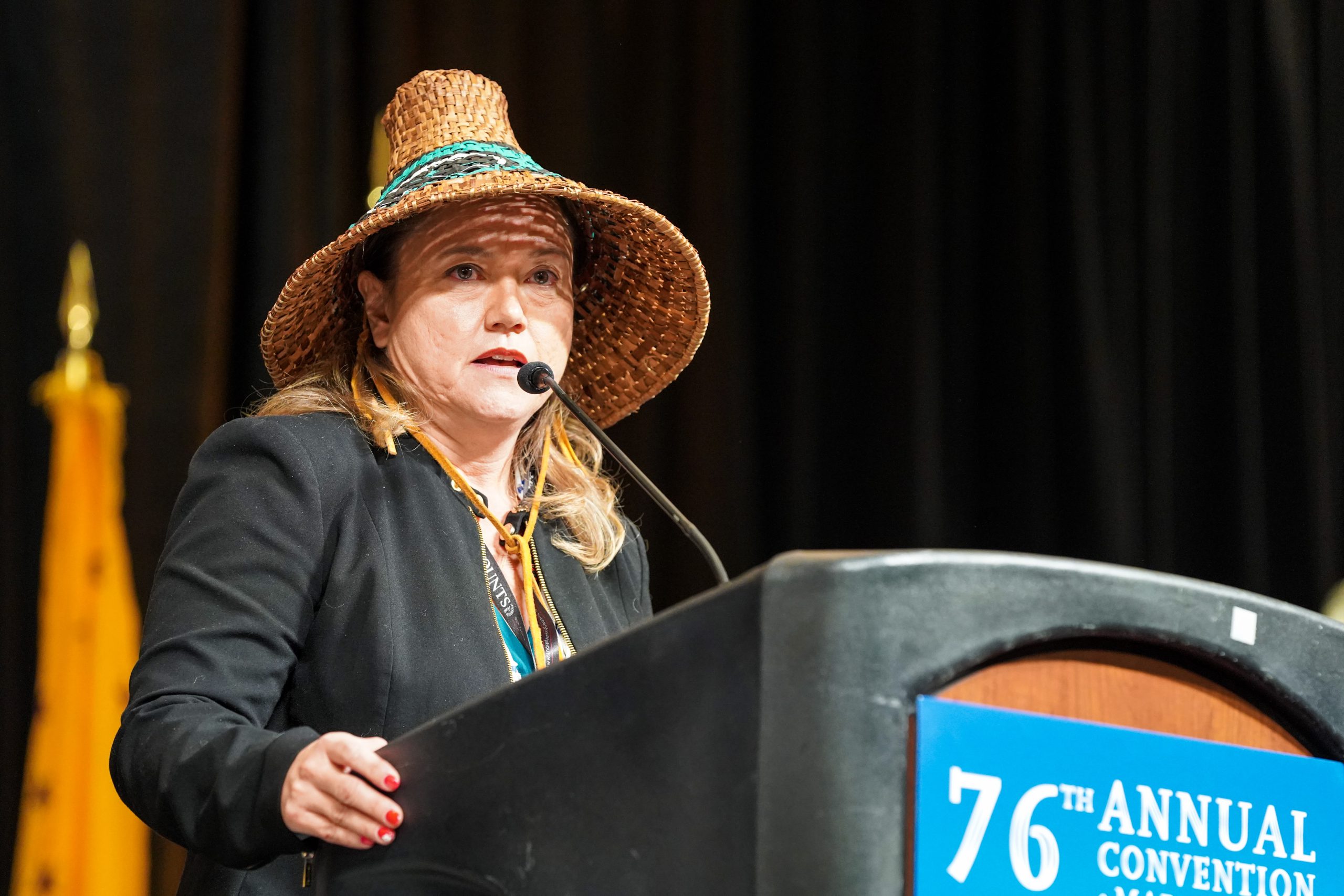Indianz.Com > News > Cronkite News: Tribal leaders lay out priorities for nation-to-nation engagement
Despite gains, tribal nations seek more inclusion in national affairs
Thursday, February 17, 2022
Cronkite News
WASHINGTON, D.C. — Tribal governments have “a foot in the door” with the federal government but they don’t yet have a seat at the table where decisions concerning them are being made, the president of the National Congress of American Indians said Monday.
Fawn Sharp’s comments came during the annual State of Indian Nations Address, in which she outlined the progress made by tribal communities in the last year and NCAI’s priorities for the coming year.
Sharp called on the federal government to respect tribal sovereignty by including Indigenous leaders in discussions on everything from climate change to infrastructure and economic recovery.
“From the administration to federal lawmakers and to state governors, it is your duty to respect our right to self-governance, to work with us for the betterment of the people we serve, and to fully honor the trust and treaty obligations this country holds with tribal nations,” Sharp said.
Davids, a member of the Ho-Chunk Nation, leads the bipartisan Congressional Native American Caucus with Rep. Tom Cole, R-Oklahoma, who is a member of the Chickasaw Nation. She said the caucus is working to educate Congress on issues facing tribal communities and ensuring that their priorities are being centered during policy discussions. One of the priorities that Sharp emphasized is engaging tribes in the development of vital infrastructure on Native lands. She praised Congress for passing the bipartisan infrastructure bill last November, which includes $13 billion for projects like developing clean water resources and expanding broadband services on Native lands. But Sharp said the federal government still needs to support conversations with tribal leaders and work to efficiently implement these resources. “Consultation is simply not negotiable,” she said. “I call on the Biden administration to ensure that tribal nations are consulted with free, prior and informed consent, to ensure the infrastructure planning that’s occurring across this country has tribal nations’ feedback embedded within each blueprint.” Sharp attributed the law’s investment in Native lands to the work Indigenous leaders and advocates have done in demanding the federal government’s support. Davids agreed, saying caucus members “worked diligently” to guarantee that the infrastructure bill included the funding Indian Country needs. “I absolutely made sure to communicate at every single meeting we had during negotiations … those resources need to be there,” Davids said. Sharp also said Native people are key to advancing the fight against climate change. Traditional land-management systems developed by Indigenous communities can help protect tribal land and resources from natural disaster, she said, citing wildfire prevention measures California adopted from the Karuk tribe. “It is our sovereign right to manage and protect our resources,” Sharp said. “And it’s the federal government’s responsibility to ensure that is carried out through cooperative agreements concerning both state and federal lands.”Today, I delivered the @NCAI1944 Congressional Response. As we work towards a brighter future for Indian Country, we cannot lose sight of the issues that historically have affected and continue to affect our communities.
— Rep. Sharice Davids (@RepDavids) February 14, 2022
I am committed to being your partner in Congress.

Note: This story originally appeared on Cronkite News. It is published via a Creative Commons license. Cronkite News is produced by the Walter Cronkite School of Journalism and Mass Communication at Arizona State University.
Search
Filed Under
Tags
More Headlines
Press Release: National Museum of the American Indian hosts Native art market
AUDIO: Sea Lion Predation in the Pacific Northwest
Native America Calling: Tribal colleges see an uncertain federal funding road ahead
Native America Calling: Short films taking on big stories
Native America Calling: Advocates push back against new obstacles to Missing and Murdered Indigenous Relatives momentum
Native America Calling: For all its promise, AI is a potential threat to culture
NAFOA: 5 Things You Need to Know this Week (November 24, 2025)
Chuck Hoskin: Cherokee Nation invests in rural transportation
Native America Calling: Native candidates make strides in local elections
National Congress of American Indians returns incumbents and welcomes newcomers to leadership
National Congress of American Indians chooses leadership at big convention
‘Not voting is still a vote’: Native turnout drops amid changes in political winds
Native America Calling: Indigenous voices speak up, but have little clout at COP30
‘It’s bull****’: Indian Country confronts challenges at largest inter-tribal conference
Native America Calling: The constant burden on tribal hunters to justify their treaty rights
More Headlines
AUDIO: Sea Lion Predation in the Pacific Northwest
Native America Calling: Tribal colleges see an uncertain federal funding road ahead
Native America Calling: Short films taking on big stories
Native America Calling: Advocates push back against new obstacles to Missing and Murdered Indigenous Relatives momentum
Native America Calling: For all its promise, AI is a potential threat to culture
NAFOA: 5 Things You Need to Know this Week (November 24, 2025)
Chuck Hoskin: Cherokee Nation invests in rural transportation
Native America Calling: Native candidates make strides in local elections
National Congress of American Indians returns incumbents and welcomes newcomers to leadership
National Congress of American Indians chooses leadership at big convention
‘Not voting is still a vote’: Native turnout drops amid changes in political winds
Native America Calling: Indigenous voices speak up, but have little clout at COP30
‘It’s bull****’: Indian Country confronts challenges at largest inter-tribal conference
Native America Calling: The constant burden on tribal hunters to justify their treaty rights
More Headlines